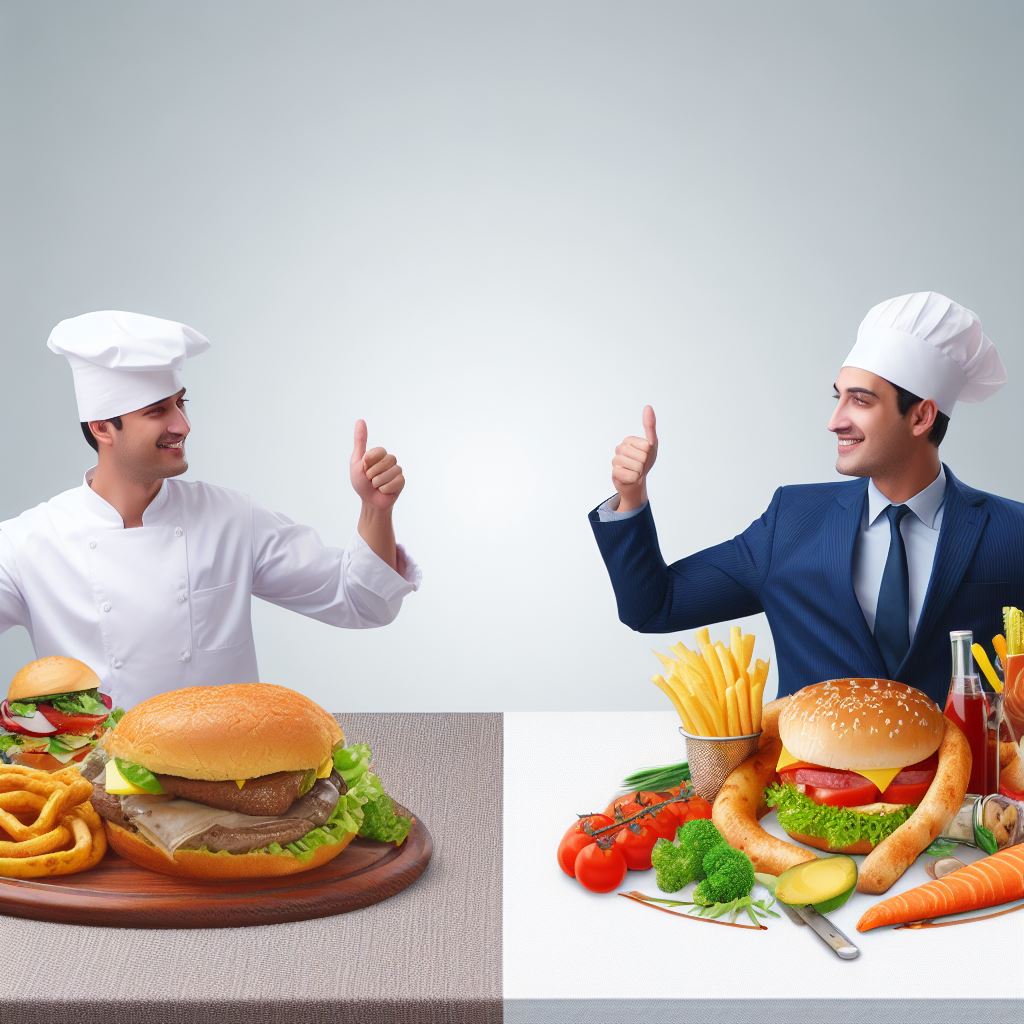Introduction
Embarking on a culinary career in the US opens two distinct paths: restaurants and personal chefs.
Explore:
- Growing Culinary Landscape: The industry flourishes, evolving into a dynamic force in recent years.
- Career Divergence: Two avenues beckon aspiring chefs‘restaurants, bustling with energy, and personal chef roles, offering intimacy.
In this blog post, we delve into the nuances, guiding you through factors shaping these culinary trajectories.
Explore the intensity of restaurant kitchens, the flexibility of personal chef roles, and the considerations that mold your career.
As we dissect work-life balance, job security, and long-term aspirations, you’ll navigate the culinary crossroads, equipped to make an informed choice in this thriving culinary landscape.
Read: Sustainable Cooking: The Green Movement in US Kitchens
Section 1: Restaurant Industry
Discuss the advantages of building a career in the restaurant industry
Building a career in the restaurant industry offers several advantages:
Opportunities for learning and skill development
Restaurants provide a platform for individuals to continuously expand their knowledge and hone their culinary skills.
The dynamic nature of the industry offers ample opportunities for learning and growth.
From experimenting with new ingredients to exploring different cooking techniques, chefs in restaurants are constantly pushed to innovate and develop their skill set.
Exposure to various cuisines and techniques
Additionally, working in restaurants exposes individuals to a wide variety of cuisines and culinary traditions.
It allows them to broaden their palate and develop a deep understanding of different flavors and ingredients.
This exposure not only enriches their culinary knowledge but also helps them become more versatile and adaptable in their cooking styles.
Potential for networking and building professional relationships
Moreover, the restaurant industry offers a unique opportunity for networking and building professional relationships.
Chefs often collaborate with suppliers, farmers, and other professionals in the industry, establishing long-term connections that can benefit their career.
These relationships can lead to exciting collaborations, job opportunities, and mentorship.
Outline the different roles and career paths within the restaurant industry
Within the restaurant industry, there are different roles and career paths:
- Chef: Responsible for menu creation, food preparation, and supervising the kitchen staff
- Sous Chef: Assists the head chef, manages the kitchen, and trains junior chefs
- Line Cook: Prepares and cooks food according to the chef’s instructions
- Sommelier: Specializes in wine selection and pairing, ensuring a delightful dining experience
- Restaurant Manager: Oversees daily operations, manages staff, and ensures customer satisfaction
Highlight the challenges and drawbacks of working in restaurants
However, working in restaurants also has its challenges and drawbacks:
Long working hours and demanding schedules
Despite the advantages, it is important to acknowledge the challenges of working in restaurants.
The long working hours and demanding schedules can take a toll on individuals, impacting their physical and mental well-being.
Transform Your Career Today
Unlock a personalized career strategy that drives real results. Get tailored advice and a roadmap designed just for you.
Start NowChefs often work late evenings, weekends, and holidays, sacrificing personal time and social commitments.
High-pressure and fast-paced environment
The high-pressure and fast-paced environment can also be overwhelming.
The need to deliver consistent quality, meet customer expectations, and handle time constraints can lead to stress and burnout.
The ability to work well under pressure and maintain composure is essential in the restaurant industry.
Limited creative freedom and autonomy
Furthermore, working in restaurants may sometimes limit creative freedom and autonomy.
Chefs often have to adhere to established menus, keeping the customers’ preferences in mind.
This can restrict their ability to experiment with new dishes or showcase their full creative potential.
Despite these challenges, many individuals find fulfillment and success in the restaurant industry.
It allows passionate individuals to showcase their culinary skills, learn from experienced professionals, and build a strong network within the industry.
Therefore, the restaurant industry provides unique advantages for individuals looking to build a culinary career.
From learning and skill development to exposure to various cuisines and networking opportunities, working in restaurants can be rewarding.
However, it is crucial to consider the challenges such as long working hours, high-pressure environment, and limited creative freedom that come with the territory.
Ultimately, individuals must weigh these factors and make an informed decision based on their passion, goals, and personal preferences.
Read: Freelancing & Pop-Ups: The New Wave of Cheffing in America

Uncover the Details: Bank Teller Job Description Explained
Section 2: Personal Chef Industry
Choosing a career path in the culinary industry can lead to various opportunities and specialties.
One such avenue is becoming a personal chef.
This increasingly popular profession offers unique advantages and challenges compared to traditional restaurant work.
In this section, we will explore the benefits, potential financial advantages, and the limitations of pursuing a career as a personal chef.
Showcase Your Business Today
Reach thousands of readers actively exploring professional services. Publish your business profile and grow your audience now.
Publish NowBenefits of Pursuing a Career as a Personal Chef
One of the most enticing aspects of being a personal chef is the flexibility it provides.
Unlike restaurant chefs who work long hours and adhere to fixed schedules, personal chefs have the freedom to set their own hours and choose the clients they work with.
This flexibility allows for a better work-life balance and opens up the possibility of taking on various projects simultaneously.
Another advantage of being a personal chef is the increased control over the creative process and menu development.
Personal chefs have the autonomy to design unique menus tailored to the preferences and dietary restrictions of their clients.
This freedom fosters creativity and allows chefs to experiment with different flavors and ingredients.
Additionally, working closely with individual clients grants personal chefs the opportunity to build strong relationships.
This personal connection with clients can lead to repeat business and referrals, which are crucial for career growth.
Potential Financial Advantages of Working as a Personal Chef
Financially, working as a personal chef can be lucrative.
With private clients, personal chefs have the potential to earn higher wages compared to their counterparts in restaurants.
Additionally, personal chefs have the opportunity to supplement their income through catering events or conducting cooking classes, further expanding their earning potential.
However, being a personal chef also presents its fair share of challenges.
One of the key requirements for success in this field is excellent organization and planning skills.
Personal chefs must be able to manage their time effectively, juggling multiple clients and ensuring all their culinary needs are met.
Furthermore, competition for clients can be fierce, especially in areas with a saturated personal chef market.
Personal chefs need to actively market themselves and constantly seek new clients to maintain a consistent workload.
Challenges and Limitations of Being a Personal Chef
Another limitation of being a personal chef is the limited exposure to different cuisines and techniques compared to working in restaurants.
While personal chefs have the advantage of designing personalized menus, they may miss out on the opportunity to work with a wide range of ingredients and learn from experienced chefs in a restaurant setting.
Most importantly, pursuing a career as a personal chef offers distinct benefits.
The flexibility to set schedules and choose clients, the control over menu development, and the chance to build strong client relationships all contribute to the allure of this profession.
Furthermore, the potential financial advantages through higher earning potential and additional income sources make it an appealing choice.
However, personal chefs must be prepared for the challenges of organization, competition, and limited exposure to different culinary experiences.
Ultimately, the decision to become a personal chef depends on a chef’s individual preferences and career goals.
Read: Networking in the Kitchen: Chef Associations in the USA
Section 3: Factors to Consider
Choosing between restaurant and personal chef careers involves weighing essential factors that impact your professional journey.
- Consider Your Preferences: Delve into personal preferences, aligning them with career goals for a fulfilling culinary path.
- Lifestyle Implications: Examine the lifestyle each path offers. Restaurants demand intensity, while personal chefs enjoy flexible schedules.
- Work-Life Balance: Contrast restaurant demands with the flexible hours personal chefs savor, tailoring your choice to lifestyle needs.
- Job Security vs. Income Fluctuations: Assess the stability of the restaurant industry against the income variability personal chefs may face.
- Evaluate Skills, Interests, and Long-Term Aspirations: Gauge your strengths, passions, and long-term goals, aligning them with the demands of each culinary path.
- Encourage Reflection: Reflect on your skills, interests, and long-term aspirations to make an informed decision about your culinary career.
- Research and Information Gathering: Explore the restaurant scene, network with chefs, stay updated on industry trends, and identify necessary qualifications.
As you navigate this career crossroads, consider personal preferences, weigh lifestyle implications, and align choices with long-term aspirations.
Thorough research and reflection will empower you to make informed decisions in the dynamic culinary landscape.
Read: Cross-Cultural Cooking: Embracing Global Flavors in the US
Conclusion
Whether you choose a career as a chef in a restaurant or as a personal chef, it is important to consider your personal factors.
Both options have their own advantages and challenges.
Restaurants offer the opportunity to work in a fast-paced environment, gain diverse experiences, and potentially reach a wider audience.
However, long hours, demanding work conditions, and less control over the menu may be some of the downsides.
On the other hand, being a personal chef allows for creativity, flexibility, and building personal relationships with clients.
It provides a more intimate and tailored experience.
However, it may involve constant travel, limited networking opportunities, and the need for strong self-promotion.
Tthe decision should be based on your passion, goals, lifestyle preferences, and family commitments.
It is crucial to explore the culinary industry, intern or work part-time in different settings, and seek guidance from professionals to make an informed decision.
We encourage you to dive into the culinary industry, gather as much information as possible, and make deliberate choices.
Follow your passion, but also consider your personal factors before embarking on your career path.
We would love to hear your thoughts and experiences!
Showcase Your Business Today
Reach thousands of readers actively exploring professional services. Publish your business profile and grow your audience now.
Publish NowPlease share them in the comments section below.
Let’s engage in a conversation and learn from each other in this exciting and dynamic field.
[E-Books for Sale]
The Big Book of 500 High-Paying Jobs in America: Unlock Your Earning Potential
$19.99 • 500 High-Paying Jobs • 330 pages
Explore 500 high-paying jobs in America and learn how to boost your career, earn more, and achieve success!
See All 500 High-Paying Jobs of this E-Book
1001 Professions Without a Degree: High-Paying American Jobs You Can Start Now
$19.99 • 1001 Professions Without a Degree • 174 pages
Discover 1001 high-paying jobs without a degree! Unlock career tips, skills, and success strategies for just $19.99!




